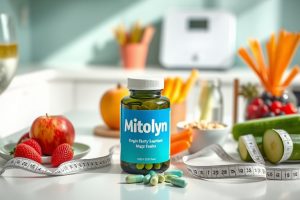Introduction
Cellular regeneration is a fundamental process in maintaining health, repairing tissues, and supporting overall bodily functions. As interest in enhancing these natural processes grows, many turn to dietary supplements claiming to boost cellular health. Among these, Mitolyn has garnered attention, though scientific research on its effectiveness remains limited. Understanding what is known—and what is not—is essential for making informed health decisions.
Understanding Cellular Regeneration and the Role of Supplements
Cellular regeneration involves the body’s ability to replace damaged or aging cells with new ones, a process vital for healing and maintaining tissue function. This process is complex, involving various biological pathways such as stem cell activation, mitochondrial function, and gene expression. Many supplements are marketed to support these mechanisms, including antioxidants, mitochondrial enhancers, and anti-inflammatory agents. However, the scientific basis for many of these claims varies, and not all supplements have robust evidence backing their efficacy.
It is crucial to approach cellular regeneration supplements with an evidence-based mindset. While some may offer benefits supported by scientific studies, others rely heavily on marketing claims without substantial validation. Relying on peer-reviewed research and clinical trials helps ensure that interventions are both safe and effective.
What Is Mitolyn? Overview and Market Presence
Mitolyn is a supplement that has entered the market with claims related to boosting mitochondrial health and supporting cellular regeneration. It is often marketed as a product that can enhance energy, improve metabolic function, and promote overall cellular vitality. Available through various online platforms, Mitolyn is positioned as a natural aid for those seeking to optimize their cellular health, though specific ingredients and formulations may vary depending on the manufacturer.
Marketing claims surrounding Mitolyn frequently emphasize its potential to support regenerative processes at the cellular level, but it is important to scrutinize these assertions critically, especially given the limited scientific data available.
Scientific Evidence Supporting the Use of Mitolyn for Cellular Regeneration
Currently, there is a paucity of rigorous scientific studies or peer-reviewed research directly evaluating Mitolyn’s efficacy in promoting cellular regeneration. Most available information stems from marketing materials rather than clinical trials or scientific publications. As a result, there is no credible scientific support confirming that Mitolyn effectively enhances cellular repair or regeneration processes.
Distinguishing between marketing claims and scientific validation is essential. While some ingredients in supplements like Mitolyn may have preliminary evidence suggesting potential benefits, this does not equate to proven efficacy. The gold standard remains peer-reviewed research demonstrating clear, reproducible results in humans.
Biological Mechanisms — How Could Mitolyn Potentially Influence Cellular Regeneration?
Cellular regeneration involves pathways such as mitochondrial biogenesis, stem cell activation, and DNA repair. Some hypotheses suggest that supplements targeting mitochondrial function could support these processes. If Mitolyn contains ingredients that influence mitochondrial health, it might theoretically support cellular energy production and repair mechanisms.
However, without concrete scientific evidence demonstrating that Mitolyn’s components can modulate these pathways effectively, such mechanisms remain speculative. Critical assessment indicates that current data do not substantiate claims that Mitolyn directly influences biological pathways involved in regeneration.
Safety, Regulations, and Quality Control of Mitolyn
When considering supplements claiming to promote regeneration, safety is paramount. The regulatory landscape for dietary supplements varies by country, and many products are not evaluated for efficacy or safety before reaching consumers. Mitolyn’s regulatory status is typically unapproved by major health authorities, meaning its safety profile has not undergone rigorous review.
Ensuring product quality and authenticity is also vital. Variations in sourcing, manufacturing practices, and ingredient purity can impact safety and effectiveness. Consumers should prioritize products from reputable sources and be cautious of unverified claims or products lacking transparency about their ingredients.
What Consumers Should Know Before Considering Mitolyn
Before trying any supplement like Mitolyn, consulting healthcare professionals is essential, especially for individuals with underlying health conditions or those taking medications. Critical evaluation of supplement claims—looking for scientific evidence and peer-reviewed studies—is necessary to avoid falling prey to unsubstantiated health claims.
Unverified products pose risks, including potential adverse effects and interactions with other medications. Relying on scientifically validated approaches remains the safest way to support cellular health, rather than unproven supplements with limited evidence.
Final Thoughts: Navigating Claims About Mitolyn and Cellular Regeneration
In summary, there is currently little scientific evidence to support the claims that Mitolyn significantly promotes cellular regeneration. While the concept of enhancing cellular repair is appealing, it is crucial to base health decisions on credible research. Evidence-based approaches—such as maintaining a balanced diet, engaging in regular exercise, and seeking medical therapies when appropriate—are proven methods to support cellular health.
For those interested in exploring regenerative medicine or cellular health, staying informed and consulting qualified healthcare providers can help ensure safe and effective strategies. Remember, skepticism and critical thinking are your best tools when evaluating new health claims and supplements.




